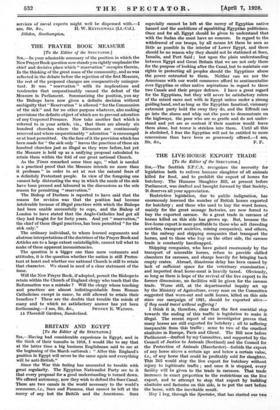THE PRAYER BOOK MEASURE
[To the Editor of the SPECTATOR.] • Sra,—In your admirable summary of the position in which,the New Prayer Book question now stands you rightly emphasize the chief and decisive place which " reservation" occupies therein. In the thinking of the great mass of the community, and as was reflected in the debate before the rejection of the first Measure, the rest of the proposed changes are comparatively unimpor- tant. It was " reservation" with its implications and tendencies that unquestionably caused the defeat of the Measure in Parliament. Summarizing the position, you say the Bishops have now given a definite decision without ambiguity that " Reservation " is allowed " for the Communion of the sick" and for no other purpose whatever, also making provisions' the definite object of which are to prevent adoration of any Corporeal Presence. Now take another fact which is referred to in your article, viz., that there are already six hundred churches where the Elements are continuously reserved and where unquestionably adoration " is encouraged or at least permitted. On the face of it the provision which has been made for " the sick only " leaves the practices of these six hundred churches just as illegal as they were before, but yet the Measure is held up as a unifying proposal calculated to retain them within the fold of our great national Church.
As the Times remarked some time ago, " what is needed is a practical proof that the Measure intends no more than it professes in order to set at rest the natural fears of a definitely Protestant people. In view of the foregoing one cannot help distrusting the way in which the needs of the sick have been pressed and laboured in the discussions as the sole reason for permitting " reservation." • The Bishop of Durham is reported to have said that the reason' for revision was that the position had become intolerable because of illegal practices with which the Bishops had been unable successfully to cope, and the Bishop of London to have stated that the Anglo-Catholics had got all they had fought for for forty years. And yet " reservation," the chief of these illegal practices, has been permitted " for the sick only."
The ordinary individual, to whom learned arguments and abstruse interpretations of the doctrines of the Prayer Book and Articles are to a large extent unintelligible, cannot tell what to make of these apparent inconsistencies.
The question is a bigger one than mere vestments and attitudes, it is the question whether the nation is still Protes- tant at heart and whether our national Church is still to retain that character. We stand in need of a` clear statement of the issue.
Will the New Prayer Book, if adopted, permit the Bishops to retain within the Church of England elergy'who teach that the Reformation was a mistake ? Will the clergy whose teaching and practices are almost indistinguishable from Roman Catholicism except in name, be still allowed to retain their benefices ? These are the doubts that trouble the minds of many and to which no satisfactory answer has yet been






































 Previous page
Previous page